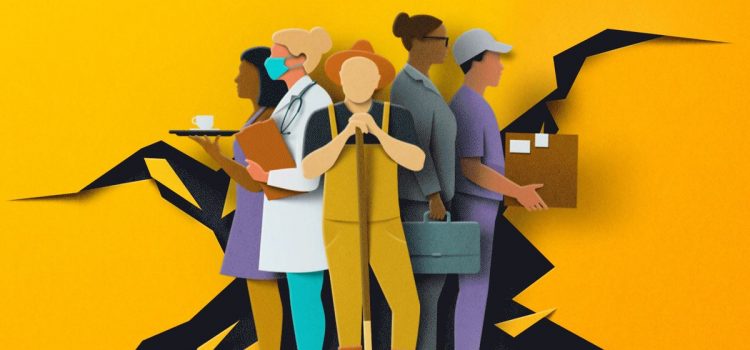


:no_upscale()/cdn.vox-cdn.com/uploads/chorus_asset/file/21899595/VOX_The_Highlight_Box_Logo_Horizontal.png)
“We often begin to understand things only after they break down. This is why, in addition to being a worldwide catastrophe, the pandemic has been a large-scale philosophical experiment,” Jonathan Malesic, author of The End of Burnout: Why Work Drains Us and How to Build Better Lives, writes in this month’s issue of the Highlight.
What has broken down, of course, is work, and what American workers, policymakers, and employers now can see plainly are the countless truths the pandemic laid bare: that productivity does not actually require an air-polluting, hourlong daily drive to a soulless downtown office building; that a fair and just society ought not put the poorest, most vulnerable Americans in danger in the name of capitalism; that the entire economy might just be held together by a rapidly dwindling sea of people — child care workers — earning roughly $13 an hour, with no benefits.
In this month’s Future of Work issue, the Highlight and Recode teamed up to explore the precarity faced by those workers whom the Great Resignation did not offer much in the way of increased power or security. We look beyond simply what is broken about their working lives, asking policy experts and workers themselves: What could make work better?
In our cover story, Rani Molla and Emily Stewart talk to those whose jobs, in this supposedly revolutionary time for worker power, haven’t changed for the better. For many who don’t have the luxury of working from home — farmers, food servers, truck drivers, teachers, home health aides, housekeepers, bank tellers, and others — slightly higher wages are masking more difficult and dangerous working conditions they expect will only continue into the so-called future of work.
The pandemic also showed Americans just how reliant the economy is on child care, and how incredibly fragile that industry is. Turnover is high. Making ends meet is impossible. The very people who need child care to allow them to work often are those without the means to afford it. Vox shadows one care worker over the course of a day that is both joyful and exhausting in order to better understand the work that ensures other Americans can do their jobs.
Though Malesic has become a well-known voice calling for an overhaul of work — he’s called it a “bad bargain” for many — he has found, perhaps surprisingly, that many Americans want to find their jobs meaningful, even if that meaning has lately come with stress and exploitation. In this issue, he explores what it might take to create a future in which we aren’t so reliant on work to live and could instead be freed to derive satisfaction from it.
Perhaps no employer in the past 50 years has transformed consumer expectations quite like e-commerce giant Amazon. Those changes have begun shifting what work is like, too, not only for the 1.1 million people Amazon directly employs, but also for its vast network of contractors — and for people working for the many companies that want to emulate Amazon’s methods for making its workforce and workflows hyper-efficient.
Finally, the Future of Work issue looks at Gen Z and its penchant for fearlessly posting about capitalism, labor, and employer behavior online, and we ask journalist and author Eyal Press about the nation’s worst, most exploitative jobs and just how complicit the rest of us are when others must do our “dirty work” for us.
:no_upscale()/cdn.vox-cdn.com/uploads/chorus_asset/file/23376234/Future_of_Work_Final_Kondrich.jpg)
Michelle Kondrich for Vox
What if the future of work is exactly the same?
For many, the gains in worker pay and power during the pandemic are fading fast — if they even saw them at all.
By Rani Molla and Emily Stewart
:no_upscale()/cdn.vox-cdn.com/uploads/chorus_asset/file/23372840/20220322_highlight_childcare_28.jpg)
Tim Tai for Vox
When your job helps the rest of America work (Coming Tuesday)
Why so many are giving up on child care work and what it will mean for everyone else.
By Anna North
:no_upscale()/cdn.vox-cdn.com/uploads/chorus_asset/file/23376147/20220405_Vox.jpg)
Mojo Wang for Vox
What it would take to make us love our jobs again (Coming Wednesday)
Recognizing that many of us find purpose in what we do is a good start.
By Jonathan Malesic
:no_upscale()/cdn.vox-cdn.com/uploads/chorus_asset/file/23392127/This_Amazonian_Life_2.jpg)
Lindsay Mound for Vox
The Amazonification of the American workforce (Coming Thursday)
The e-commerce giant’s labor issues expose the complicated truth about getting what we want when we want it.
By Jason Del Rey
:no_upscale()/cdn.vox-cdn.com/uploads/chorus_asset/file/23366461/bhayward_final.jpg)
Bea Hayward for Vox
Gen Z does not dream of labor (Coming Friday)
On TikTok and online, the youngest workers are rejecting work as we know it. How will that play out IRL?
By Terry Nguyen
:no_upscale()/cdn.vox-cdn.com/uploads/chorus_asset/file/23374465/GettyImages_1210676471.jpg)
Sandy Huffaker/AFP via Getty Images
What does it mean to take America’s “jobs of last resort”? (Coming Friday)
Author Eyal Press on the nation’s most morally troubling labor — and why many refuse to acknowledge it.
By Jamil Smith
